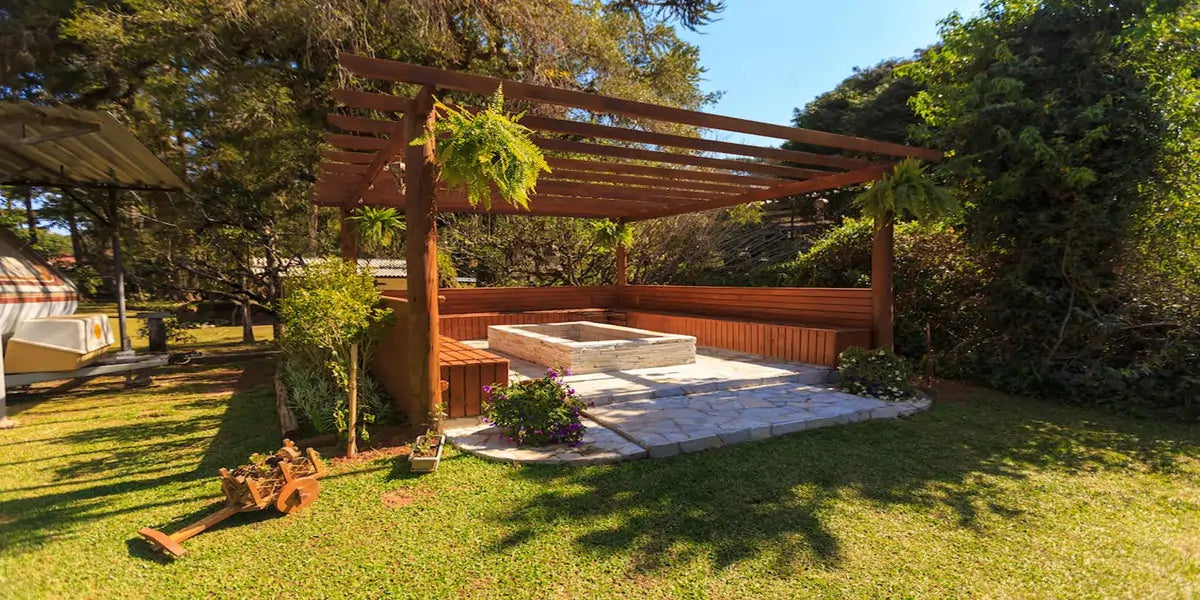Have you researched how to choose plants for your backyard? You probably have many of your own unique opinions about plants. However, there is one criterion that every gardener needs to follow, and that is not to plant harmful plants. Some plants are harmless but can affect your life and are not recommended.

(tree in bacyard)
If you don't know how yet, here are our suggestions. Below is a list of plants that should never be in your backyard.
Never keep these plants in your backyard
Oleander
Oleander is a beautiful, tough, long-blooming ornamental shrub. The plant blooms from early summer to mid-autumn with red, pink, yellow, or white flowers.
Although oleander is highly ornamental, it is poisonous to humans and pets. Every part of the oleander is poisonous. Ingesting even tiny amounts of oleander can kill humans or animals.
Oleander is a high-risk plant for both you and your pets. This plant is not suitable for planting in your garden or near your home.
Caladium
Caladium is a very popular green plant commonly found in yards and gardens. Caladium comes in a variety of colors, including white, red, and pink. This plant is often placed indoors as a potted plant as an ornamental plant.
However, it is important to note that this plant is considered toxic to humans and animals. It may cause burning or swelling in the mouth and throat. Sometimes, it blocks the airways and causes difficulty breathing.
Foxglove
Foxglove is an attractive plant that is grown everywhere. This plant is often cultivated in private yards or gardens because of its beautiful appearance. Its flowers are bell-shaped and can be white, purple, yellow, or pink.

(Foxglove)
All parts of Foxglove contain several cardiac glycosides, including digoxin and digoxigenin (these substances are highly toxic). Ingestion of Foxglove may cause heart failure or death in humans or pets.
Yew
Yew is a shrub commonly used as a landscape plant. This plant has evergreen needles and bright red berries. If you wish to grow redwood in your yard, do so carefully as all parts of the plant are highly toxic. Taxine can cause difficulty breathing, dizziness, and convulsions in humans, and cause sudden death in animals.
Morning glory
Morning Glory is an annual vine. The plant's flowers come in a variety of colors, including white, purple, pink, and blue. Due to its beautiful appearance, this plant is often planted in gardens.
However, morning glories contain toxic indole alkaloids, which can cause vomiting in pets. If you accidentally ingest morning glories, you may experience diarrhea or hallucinations.

(Morning glory)
If you have pets at home, it's best not to plant petunias in the garden or near the house, for both your and your pet's benefit.
Do not keep these trees in the backyard or near the house
Trees make your garden look more attractive. Also, animals such as your pets and birds will enjoy having a tree in your garden and they can play near it.
But some trees cause trouble for you and you must eliminate them from your tree list.
Ginkgo biloba
Ginkgo biloba is commonly found in urban landscapes. It has unique fan-shaped leaves that turn a beautiful golden yellow in the fall. This plant is highly resistant to disease and is often grown in pots as a bonsai tree.
However, avoid planting female ginkgo in your yard, as it will drop its fruit in the fall. Some gardeners find it a hassle to clean up these fruits in the fall. And, when these fruits rot, they emit an unforgettable smell. If you are unfortunate enough to step on a ginkgo fruit, the horrible smell will stay with you for the rest of the day.
Populus deltoides
Populus deltoides is a majestic-looking tree that looks great in a yard to give its owners a sense of security. However, Populus deltoides can cause some problems, such as being very prone to insects and diseases, being extremely messy, and having tree roots that can invade water pipes.

(Populus deltoides)
Populus deltoides sheds branches and leaves every day. In early summer, it also sheds cottonseed, which are white clumps that can accumulate on things like houses and fences.
You will need to spend a lot of time caring for a Populus deltoides plant, which can be a hassle for you.
Mimosa tree
You'll find this romantic plant, the mimosa tree, in parks, along roadsides, and in forests. Mimosa flowers are stunning pink fan-shaped flowers. These fluffy pink flowers attract hummingbirds, butterflies, and bees in the summer.
But we don’t recommend growing this attractive-looking tree in your garden or yard. Mimosa pudica is considered an invasive species and competes fiercely with native plants for nutrients. Also, mimosa can make your garden cluttered. It will scatter the sap from the petals, leaves, and leaves. Mimosa pudica is susceptible to Fusarium wilt, a disease that often kills the tree.
Bradford Pear
The Bradford Pear is one of the trees commonly found in parks or yards. The tree has beautiful white flowers in the spring and gorgeous leaves in the fall.
However, Bradford Pear flowers can emit an unpleasant fishy smell. Moreover, the branches of this tree are very fragile and will fall off in autumn and winter.

(Bradford Pear)
Bradford Pear is considered highly invasive and competes with native plants for nutrients.
Populus nigra
Populus nigra grows quickly and is often used as a screen tree. Many people like to plant this tree in their backyard as it is considered to add beauty to their backyard. However, once you plant the tree you will find that Populus nigra is susceptible to a variety of pests and diseases.
Also, Populus nigra is considered to have a limited shelf life, approximately 15 years. Removing old trees is a hassle that many gardeners don't want to deal with.
What gardening tools for your plants and trees?
greenhouse
If your backyard or garden is large enough, you can set up a home greenhouse. Many fruit trees can be grown in a greenhouse. In a greenhouse, you can freely adjust temperature, humidity, light, and other conditions. Through manual control, you can harvest fruits all year round.
Raised garden bed
Garden beds are one of the most convenient gardening tools. You can grow fruits, vegetables, cute succulents, and more in raised garden beds. Many gardeners like to have multiple raised garden beds in their greenhouse to manage their plants. By using raised garden beds, you can prevent pests from damaging your plants. Moreover, plants can be cared for without squatting, which is friendly for gardeners with limited mobility.








